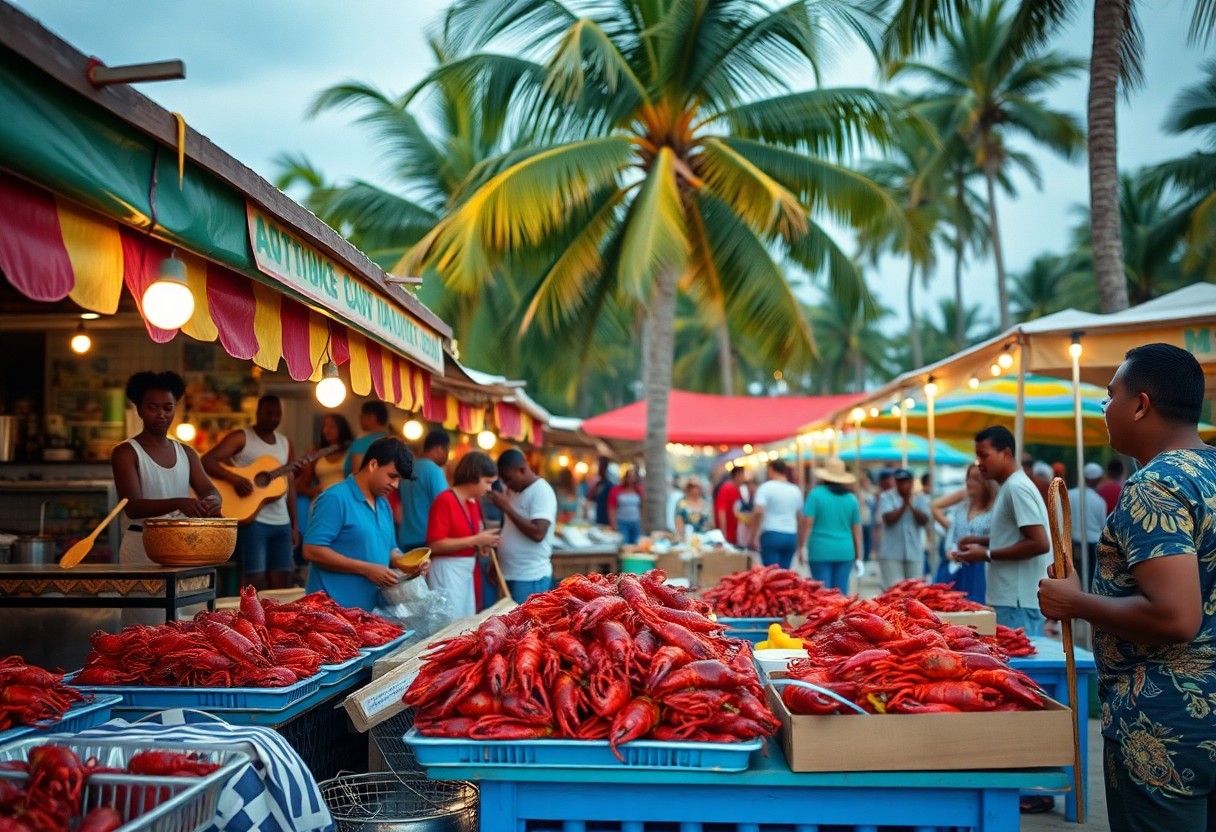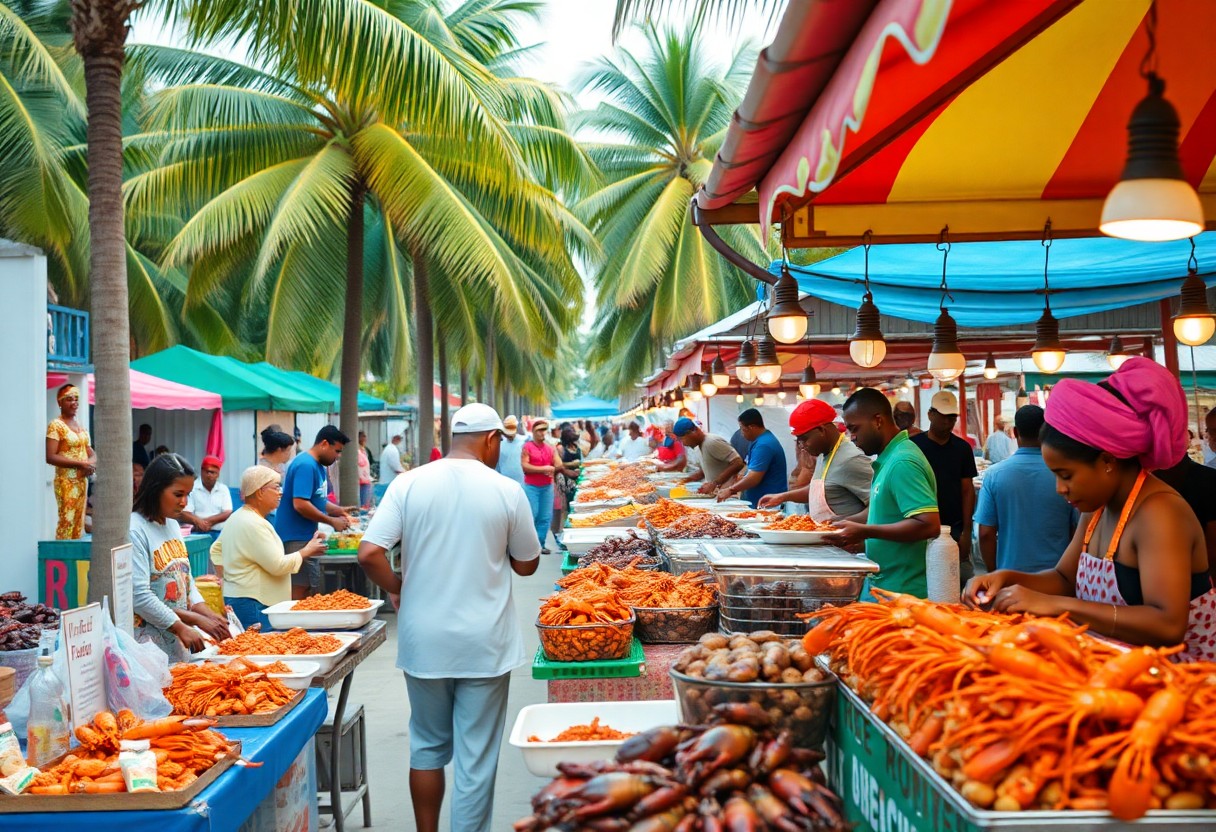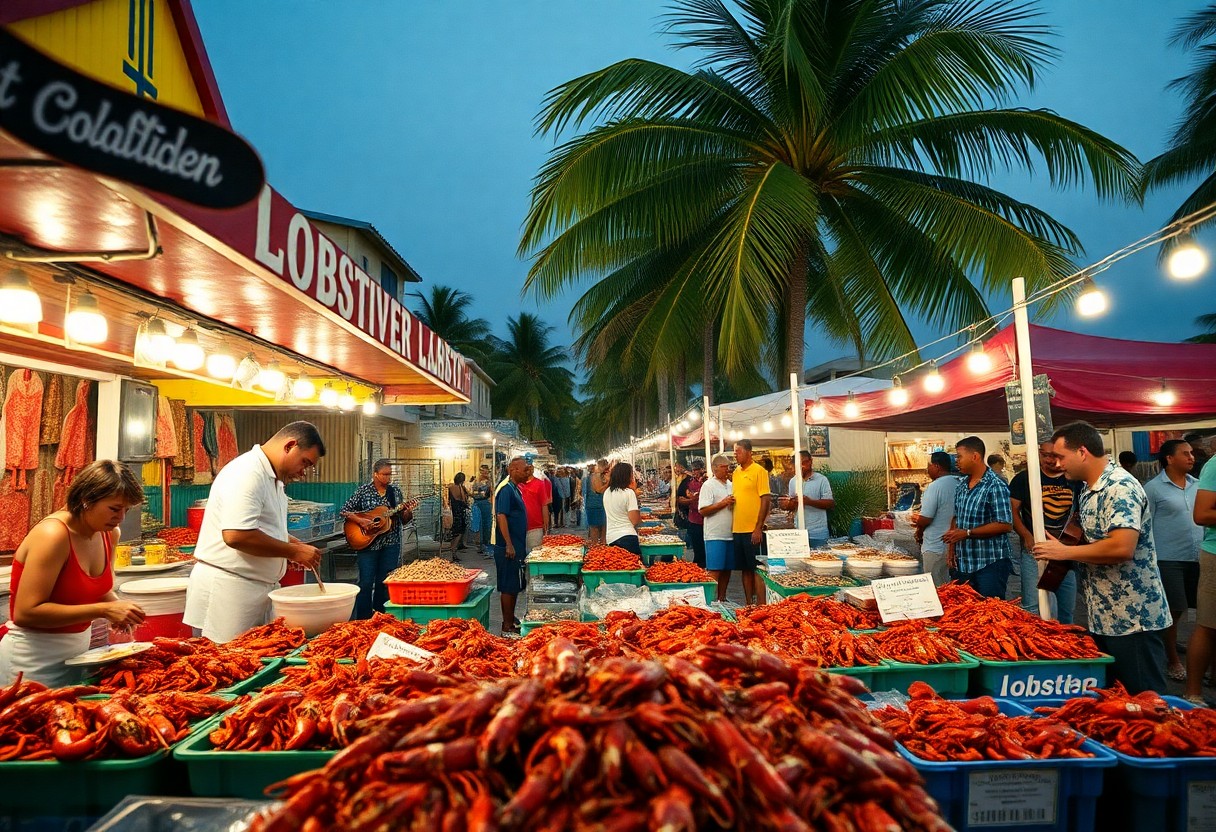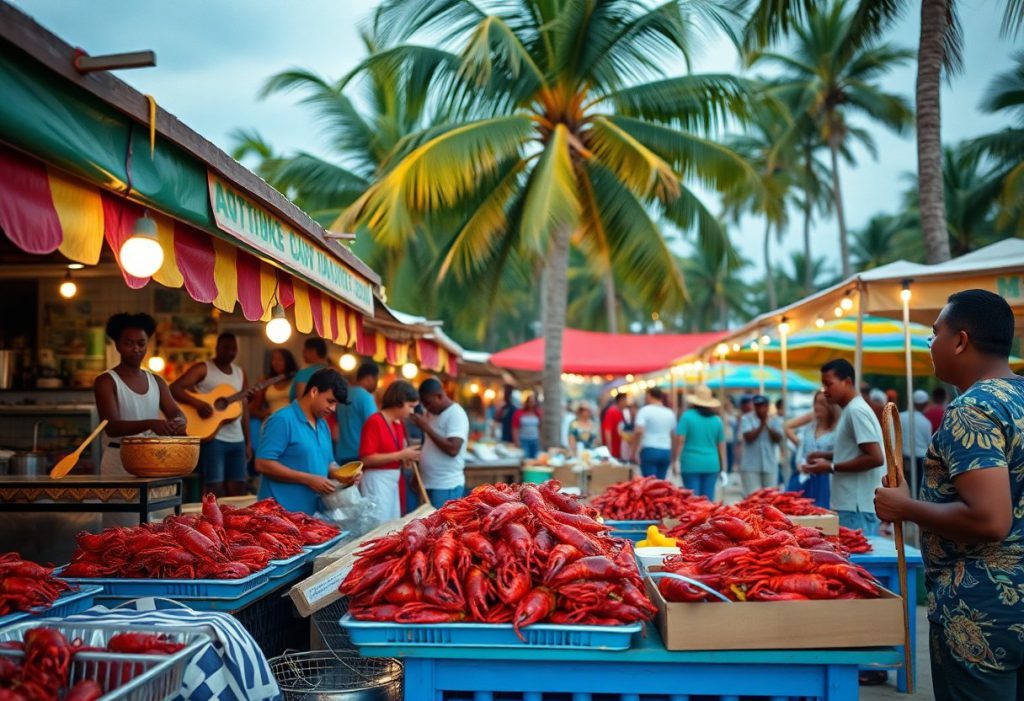Belize's lobster festivals present an enchanting fusion of cultural heritage and coastal celebrations that attract both residents and visitors. Engaging in these lively events held in Caye Caulker, San Pedro, or Placencia allows you to fully embrace a tradition that has been cherished for many years. Each festival emphasizes sustainable fishing practices, crucial for protecting Belize's fragile marine ecosystem while also empowering local communities. The festivals feature a delightful variety of culinary experiences that showcase fresh, locally-caught spiny lobster, which not only boosts the coastal economy but also enriches your culinary adventure. By attending, you play a role in the preservation of Belize's vibrant cultural legacy and its delicate marine environment.
Join the Vibrant Celebrations at Belize's Lobster Festivals
Beyond mere celebrations, the lobster festivals in Belize are dynamic cultural events that merge seafood gastronomy with cherished community traditions. Each spirited festival radiates the warmth of Belizean hospitality and highlights the significance of <a href="https://ad4sc.com/sustainability-in-belize-protecting-central-americas-jewel/">sustainable fishing practices</a>. Annually, these events draw over 15,000 visitors to various locations, establishing them as a vital component of Belize's cultural calendar and an essential experience for anyone interested in local customs and culinary delights.
Uncover Distinct Festival Experiences Throughout Belize
- Caye Caulker Lobster Fest – A lively celebration every July, featuring local music and culinary showcases that highlight traditional Belizean flavors.
- San Pedro Lobster Festival – A two-week culinary extravaganza spotlighting the island’s finest seafood dishes, perfect for food enthusiasts.
- Placencia Lobster Fest – A joyous beachside gathering complete with live entertainment and family-friendly activities that cater to all ages.
| Festival Location | Unique Features |
|---|---|
| Caye Caulker | Interactive cooking demonstrations that showcase traditional culinary skills of the local community. |
| San Pedro | Exciting lobster crawl events that allow participants to sample a diverse range of dishes. |
| Placencia | Festive beach parties with local music and engaging activities for attendees of all ages. |
| Duration | Festivities range from 2 to 14 days, providing ample opportunity to partake in the celebrations. |
| Peak Season | July to August, making it the prime time for seafood lovers to indulge in culinary delights. |
Tracing the Rich History of Belize's Lobster Festival Tradition
The journey of Belize's lobster festivals commenced in 1994 with the inception of the Caye Caulker Lobster Festival, which started as a modest fundraising initiative aimed at supporting local projects. This humble origin marked a pivotal moment in the nation’s cultural festivities, setting the stage for what would evolve into a much-anticipated annual event embraced by locals and tourists alike.
Over the years, these lobster festivals have transformed from simple community gatherings into major tourism attractions that entice international visitors. Today's festivities include exhilarating food competitions, vibrant beach parties, and educational sustainable fishing demonstrations, reinforcing their significance in both the local economy and the rich cultural tapestry of Belize.

Understanding the Crucial Role of Sustainable Fishing Practices in Belize
Diving deeper into Belize's lobster industry reveals a steadfast commitment to sustainable fishing among local communities. These dedicated fishing groups strive to harmonize the vibrant festivals with the essential task of safeguarding vital marine resources. Local fishers adhere to strict size and weight regulations, ensuring that only mature lobsters are harvested to maintain a thriving population. Regulations stipulate a minimum tail weight of 4 ounces and a carapace length of 3 inches, both of which are critical for the sustainability of the lobster population.
Examining Fishing Regulations and Guidelines for Sustainable Practices
Fishing practices in Belize are governed by clear seasonal restrictions designed to protect lobster populations. The fishing season operates from July 1 to February 28, allowing lobsters the necessary time to reproduce during the off-season. The Belize Fisheries Department plays a crucial role in enforcing these regulations, conducting regular monitoring and imposing heavy penalties for violations. By participating in these festivals, you actively support essential conservation efforts that contribute to the sustainability of the local marine ecosystem.
Diving into Traditional Fishing Techniques Employed by Local Fishers
As you explore the rich fishing heritage of Belize, you'll encounter three primary techniques utilized by local fishers: lobster traps, diving with hooks, and lobster shades. These methods have been carefully refined over generations to minimize environmental impact while ensuring effective harvest rates.
For example, lobster shades – sustainable artificial shelters – provide safe havens for lobsters, improving their chances of survival and reproduction. These structures can remain submerged for 2-3 years, unlike traditional traps that must be removed during the closed season. Gaining insight into these methods fosters a deeper appreciation for the preservation of both fishing culture and marine ecosystems in Belize.

Effective Strategies for Planning a Memorable Lobster Festival
The enthusiasm surrounding the organization of a lobster festival is palpable, yet a well-structured plan is essential for ensuring its overall success.
- Selecting an appropriate venue that can comfortably accommodate the anticipated crowd size is vital for a successful event.
- Securing permits and licenses well in advance is crucial to avoid potential delays that could hinder the festival.
- Coordinating with local vendors requires meticulous planning and open communication to guarantee seamless collaboration.
- Implementing safety measures that adhere to health regulations is critical to ensure the protection of all attendees.
It is advisable to allocate at least 3-4 months for thorough preparation, ensuring a smooth and enjoyable experience for everyone involved.
Essential Elements for Successful Festival Planning
Successfully planning your festival necessitates attention to specific details to facilitate a seamless experience for all attendees.
- Weather considerations during the July-August season can significantly influence attendance and overall enjoyment.
- Availability of an emergency response team is essential for maintaining safety throughout the festival.
- Implementing waste management systems is crucial for ensuring cleanliness and environmental responsibility during the festivities.
- Crowd control measures should be established to ensure the safety and comfort of all attendees.
Once these foundational elements are secured, you can shift your focus towards scheduling entertainment and engaging activities to captivate participants.
Ensuring Culinary Excellence at Your Festival
To guarantee food quality at your festival, maintaining proper storage temperatures for lobster is paramount. Vendors must possess food handling certifications and strictly adhere to local health guidelines. Each booth should be equipped with adequate refrigeration and sanitation stations to ensure the safety of all food served.
Moreover, it is essential to uphold food safety standards throughout the event. Establishing clear guidelines for portion control and cooking methods is vital for maintaining high culinary standards. Additionally, vendors must track their lobster sourcing to ensure compliance with Belize’s fishing regulations, which specify a minimum tail weight of 4 ounces.
Driving Economic Growth Through the Lobster Festivals
The lobster festivals have emerged as a catalyst for substantial economic development in numerous coastal communities across Belize. These vibrant events generate over $2 million annually in tourism revenue, which, in turn, stimulates job creation and bolsters local businesses. Your participation in these festivals directly contributes to the sustainable fishing industry and helps maintain traditional fishing practices that are integral to Belize's cultural identity.
Transformative Economic Advantages for Local Communities
Even the smallest fishing villages witness remarkable transformation into thriving tourist destinations during festival seasons. Local families manage food stalls, craft vendors offer unique souvenirs, and fishermen proudly showcase their fresh catch. These festivals create direct income opportunities for over 500 local families and support vital marine conservation initiatives that benefit the entire region.
Key Elements Driving Industry Growth
A detailed examination of Belize’s lobster festival industry reveals several pivotal growth drivers:
- Sustainable fishing practices that actively safeguard marine life and ecosystems.
- International tourism promotion that attracts visitors from around the globe.
- Local culinary innovation that enriches the overall festival experience.
- Community participation that fosters a sense of inclusivity and engagement.
This collective impact has led to an impressive 15% annual growth in festival attendance, underscoring the importance of these events to both the local economy and cultural landscape.
It’s essential to recognize that the success of these festivals depends on:
- Strict adherence to fishing regulations that ensure the sustainability of marine resources.
- Quality control measures that maintain high standards of food safety and preparation.
- Environmental protection initiatives that safeguard ecosystems and promote responsible fishing.
- Robust tourism infrastructure that enhances visitor experiences and community involvement.
This sustainable approach promises long-term economic benefits for local communities and the environment alike.
Dedication to Conservation Initiatives in Belize's Fishing Industry
The preservation of Belize’s spiny lobster population is of paramount importance, leading to the establishment of strict fishing regulations and seasonal restrictions. These proactive measures have effectively maintained healthy lobster populations while supporting local fishing communities. The closed season from March 1 to June 30 is crucial for successful breeding and population recovery, contributing to the long-term sustainability of the lobster fishery.
Proactive Environmental Protection Strategies for Sustainability
Even small actions can have significant impacts on lobster conservation. Local fishers practice sustainable fishing methods such as lobster shades and regulated traps designed to minimize their environmental footprint. The regulations stipulate a minimum catch size of 4 ounces and a 3-inch carapace length, ensuring that young lobsters have the opportunity to mature and reproduce before they are harvested.
Empowering Community Education Programs for Future Generations
Your interest in local conservation efforts will be rewarded as you discover how Belize's fishing communities pass down traditional sustainable fishing practices to younger generations. Local organizations frequently host workshops centered on responsible fishing methods and emphasize adherence to regulations to protect the marine environment.
Additionally, your participation in these festivals directly supports educational initiatives. The festivals serve as interactive platforms where you can engage with local fishers and learn about marine conservation efforts. These events help fund educational programs, teaching both children and visitors about the significance of sustainable fishing practices and their role in preserving Belize's rich marine biodiversity.

Maximize Your Enjoyment at the Lobster Festivals
Once you decide to attend a Belize Lobster Festival, familiarizing yourself with the safety guidelines and local regulations is crucial. Adhering to these best practices will not only enhance your festival experience but also promote sustainability while ensuring the safety of all attendees throughout the celebrations.
Essential Vendor Guidelines for a Successful Booth
If you're considering operating a booth at the festival, it is imperative to secure proper permits from local authorities. Your booth must comply with food safety standards, sourcing lobsters exclusively from licensed fishermen. It is mandatory to verify that all lobsters meet the minimum size requirement of 4 ounces and a 3-inch carapace length to ensure compliance with local regulations.
Visitor Tips for an Enjoyable Festival Experience
When attending the festival, it’s advisable to arrive early to enjoy the best selection of lobster dishes available. Your overall experience will be enhanced by bringing cash, wearing comfortable shoes, and utilizing sun protection throughout the day. Before making purchases, be sure to check the food preparation standards to ensure quality and safety.
Engaging in festival activities requires attentiveness to safety protocols to ensure a fun and secure environment. You can enrich your experience by sampling various vendor offerings, participating in local dance celebrations, and advocating for sustainable fishing practices. Festivals typically run from morning until late evening, with peak crowds occurring between 12 PM and 4 PM, so planning accordingly is essential to enjoy all that the event has to offer.
Immerse Yourself in the Vibrant Essence of Belize Lobster Festivals
By exploring Belize Lobster Festivals, you can appreciate how these events intertwine cultural celebration with sustainable practices. Visiting any of these festivals – whether in Caye Caulker, San Pedro, or Placencia – allows you to indulge in the authentic flavors of Belize while contributing to local community support. Experience firsthand how fishers adhere to stringent guidelines for lobster conservation, chefs craft exquisite dishes, and locals share their rich heritage. These festivals exemplify Belize's commitment to balancing tourism growth with environmental stewardship, establishing them as a premier model for sustainable food festivals worldwide.
Answers to Your Most Common Questions (FAQ)
Q: When and where can I attend the Lobster Festivals in Belize?
A: The Lobster Festivals commence at the start of lobster season on July 1st. The primary locations for these festivities include Caye Caulker (since 1994), Placencia (since 1998), and San Pedro (since 2007). The San Pedro festival spans two weeks, while Caye Caulker and Placencia host weekend-long celebrations, making it convenient for everyone to enjoy.
Q: What measures does Belize implement to ensure sustainable lobster fishing practices during the festivals?
A: The Belize Fisheries Department enforces strict regulations: lobsters must weigh a minimum of 4 ounces and have a carapace length of at least 3 inches. The fishing season lasts from July 1 to February 28. Fishers utilize sustainable methods such as lobster shades and traps, which must be removed during the closed season to protect lobster populations. Licensed fishers are committed to adhering to these regulations to ensure sustainability.
Q: How do the Lobster Festivals economically benefit local communities?
A: These festivals create substantial income opportunities for local fishers, restaurant owners, and businesses during the tourism low season. Restaurants participate in events like the lobster crawl, showcasing special lobster dishes while attracting thousands of visitors. The festivals enhance the local economy through food sales, accommodations, and tourism activities, providing fishing families with a stable source of income while promoting sustainable fishing practices.
The Article Belize Lobster Festivals: A Celebration of History, Sustainability, and Prosperity appeared first on Belize Travel Guide
The Article Belize Lobster Festivals: Celebrating Sustainability and Culture Was Found On https://limitsofstrategy.com
The Article Belize Lobster Festivals: A Celebration of Culture and Sustainability First Appeared ON
: https://ad4sc.com



It’s fascinating how Belize’s lobster festivals blend cultural heritage with the sustainability angle. While the focus on local communities and sustainable fishing practices is commendable, I wonder about the long-term effects of tourism on these fragile ecosystems. The influx of visitors can create pressure on resources, which raises questions about balancing cultural preservation with environmental health. Have there been any initiatives to gauge the impact of these festivals on marine life or local fishing practices? It would be interesting to hear more about how the communities measure and manage this balance while ensuring their traditions thrive.